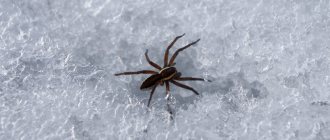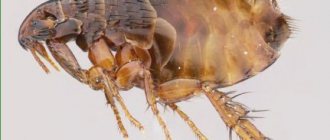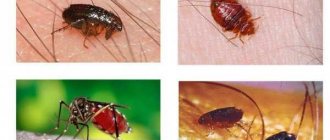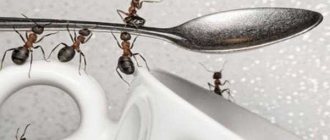Mosquitoes are one of the most unpleasant things a person can encounter. In case of mass attacks, such insects pose a real danger. In addition, some individuals carry a huge number of infections. It’s quite easy to understand where mosquitoes come from in a room in the summer, but what do such parasites do with the onset of cold weather? There are cases when even in winter you can find several mosquitoes in the house. If you don’t want problems with insects, then you need to be fully prepared. The following information about mosquitoes will help you avoid a lot of trouble, restore a quiet life and not experience unpleasant bites.
In winter, people can breathe a sigh of relief and not hear the annoying squeak. Regardless of such a factor, the sudden disappearance of mosquitoes is sometimes puzzling. Where do insects go in late autumn and winter? It is immediately necessary to understand that mosquitoes are divided into two broad groups, one of which carries dangerous diseases:
- Malarial;
- Common non-malarial.
The distribution factor is the likelihood of the spread of infections and various diseases. All females drink the blood of mammals to complete reproduction and lay a sufficient number of eggs. Enzymes contained in the blood help form a large clutch of future larvae. Males behave somewhat differently and choose nectar or plant pollen as food. Have you seen mosquito bites on your body? Do not doubt that it was the female who did her best, who urgently needed to lay eggs after fertilization.
Hibernation sites for adult mosquitoes
Only female mosquitoes drink the blood of humans and warm-blooded animals for reproduction. This way, future offspring receive the proteins and lipids necessary for growth. Males feed on flower nectar and pollen.
There is no point in adult mosquitoes flying far from humans for the winter. Otherwise, with the arrival of warmth, they will not be able to immediately begin laying eggs.
When do mosquitoes hibernate? The signal to seek shelter is the reduction in daylight hours. In countries with temperate climates this is mid-September. In October, blood-sucking insects no longer bother people.
Adult mosquitoes (imagoes) choose warm places for wintering and prefer damp rooms. Water attracts females because they lay their eggs in it after waking up.
Where do mosquitoes overwinter in the adult stage:
- Cellar, basement;
- Animal sheds;
- Outbuildings (garages, storage facilities, warehouses);
- Roofs and attics;
- Free spaces between the wooden beams of houses;
- Deep cracks in the walls;
- Window frames;
- Corners under ceilings;
- Furniture cases;
- Ventilation shafts;
- Spaces under sinks and bathtubs.
Choosing a place to live
Most often, where insects breed and spend time, they also talk about what they do in winter. If we talk about the most interesting of them, then this is, of course, a blood-sucking species, including mosquitoes. Let's take a closer look at the features of choosing housing.
Mosquitoes choose tall grass, bushes or weeds to rest. The breeding process is usually carried out in standing water with a small volume - it can even be a birdbath, street decoration in which water accumulates, and sometimes drains.
Midling midges have a wider range and can choose to live on beaches, ponds, streams or wetlands. Reproduction can occur in water, regardless of its quantity.
The midge lives near running water, including streams and rivers. They lay eggs under water, while the larvae attach themselves to stones located at the bottom - in this position they remain until the individuals turn into adults - adult insects.
Despite some differences, the presented pests choose the same shelter for the winter.
Where do forest mosquitoes hide in winter?
Female mosquitoes living in the forest feed on the blood of animals, mushroom pickers and berry pickers. With the onset of cold weather, they look for shelters in which they can safely spend the winter.
Where do mosquitoes live in the forest in winter?
- Hollow trees;
- Burrows of rodents, foxes, hares;
- Accumulations of dry grass and leaves;
- Wet soil;
- Free spaces between boulders.
Females choose places near water bodies. If spring comes early and the air temperature rises sharply, by the end of April the forests are teeming with insects.
Why do they wake up
Where and how exactly mosquitoes spend the winter is clear. But all these key features mostly concern insects living in rural areas, holiday villages and nature. But there is a whole caste of mosquitoes that is in a special position - these are urban blood-sucking parasites. And here the situation is much more serious, since sometimes they sting even in winter. How does this happen and how can these pests even get into the apartment in winter?
And the reason is quite simple, these are flooded or flooded basements, which constantly remain damp - a favorable environment for the active breeding of mosquitoes. And all due to problems in the sewer or water supply system, as well as filtration of groundwater or ingress of flood drains. Here, the temperature most often remains above zero, and new mosquito larvae settle well on any objects located near such bodies of water.
Even more interesting! Where do mosquitoes go from basements? That's right, up the ventilation pipe, and now the residents of multi-storey buildings suffer from mosquito bites even in winter. How to deal with such an insect invasion? Mosquito nets will definitely not help you here.
It is better to use a fumigator, all kinds of ultrasonic repellers, creams, fly swatters, etc. In some cases, folk remedies can provide effective assistance in the fight against “winter” mosquitoes.
However, all this will only temporarily stop this kind of invasion in your home. These problems need to be solved together on a much larger scale than the persecution of individual individuals who have entered your apartment, for example, dealing with moisture that has formed in the basement.
What happens to mosquitoes during hibernation?
When mosquitoes go into hibernation, changes occur in the body to adapt to the cold. Fat accumulates in the abdomen. Breathing and metabolic processes slow down. This state is called diapause.
At low temperatures, the insect falls into torpor and does not die even in the cold. Sometimes the body produces a viscous fatty substance - glycine, which prevents the bloodsucker from turning into a piece of ice.
During diapause, female mosquitoes become resistant to insecticides. If you spray a can of toxic substance in a barn, the blood-sucking insects will survive.
Now it’s clear where mosquitoes come from after winter. With the onset of warmth, the females’ metabolism returns to normal, they come out of their shelters and begin to actively bite people in order to lay eggs.
Habitat
Members of the family are known to prefer moderate or lower temperatures. Therefore, in regions with a hot and very humid climate: the tropics and subtropics, they are very poorly represented.
Go to website
The main habitat is Europe and Asia. Representatives of different species are found in Russia, countries of Eastern and Western Europe, and the Far East. They are found in huge quantities in the Caucasus and even in the taiga, where whole swarms and flocks of these creatures gather.
Unlike their cousins, centipedes and typical bloodsuckers, they are active most of the year. You can find an uninvited guest at home, in the basement or on a window from early spring to late autumn. They feel great both at +10 and -2 C°. Some species are not afraid of frost and are active even in winter if there is sufficient food available for their offspring.
Another remarkable fact is that representatives of the family even live in Antarctica, where they develop in the droppings of local fauna. In particular, penguins. Not every insect can boast of such vitality and stability.
The habitat remains approximately constant. But not all varieties of winter mosquitoes are open. Therefore, it is likely that ideas about them will change as scientific data accumulates.
How mosquito larvae and eggs overwinter
Eggs are characterized by the highest resistance to low temperatures and are preserved even in frost. Mosquito larvae also tend to go into diapause—to delay their development.
A female mosquito does not need to find a natural body of water to lay eggs. Any water source is suitable.
In winter, mosquito eggs and larvae are stored in the following places:
- Flooded basements;
- Car tires;
- Bottom layers of swamps, ponds, ditches;
- Road potholes.
As April (May) approaches, a rapid transformation into an adult insect occurs. This takes 4-10 days.
Dream country
Mosquitoes live in all regions of the planet, with the exception of Antarctica and several polar or subpolar islands. For example, Iceland is just such an island where there are never mosquitoes.
We recommend reading: “How do snakes winter?”
The absence of mosquitoes in Iceland and similar regions is due to the vagaries of their unpredictable climate. For example, in Iceland in the middle of winter the water often warms up unexpectedly, causing the ice to break, but then the water freezes again just a few days later. By this time, the insects have emerged from their pupae, but new frosts begin before they can complete their life cycle.
Where do mosquitoes come from in winter?
For some residents of apartment buildings and dormitories, mosquitoes plague their lives throughout the year. Why is this happening?
Perhaps the house has a room with water and a consistently warm temperature (flooded basement, cellar). There, mosquitoes lay eggs, and through ventilation shafts they climb into people's apartments and drink blood.
To solve the problem, you need to find the source of mosquito breeding and pump out (dry) the water. If you freeze the room, the mosquitoes will hibernate and stop bothering the residents, at least in winter.
When does mosquito season end?
The activity of mosquitoes depends on environmental conditions, primarily humidity and temperature. If the thermometer drops below +10⁰С, insects stop reproducing and biting and become lethargic. And, if you wonder where mosquitoes go in winter, you need to understand that the males die, and the females prepare for hibernation, in other words, they fall into a state of suspended animation, when all life processes slow down greatly.
Since mosquitoes are widespread throughout the world, it is impossible to definitively determine when their activity will cease. It all depends on the climatic and weather conditions of the region where a particular species lives.
For example, in the Krasnodar region of Russia, the mosquito season begins in early spring, while in Siberia insects wake up closer to summer. This also applies to the duration of the period of insect activity - in the south it lasts much longer than in the north.
Mosquito activity
How do foreign mosquitoes behave?
Blood-sucking insects are found in different parts of the world. In tropical countries, adult mosquitoes hibernate during drought. People suffer from an invasion of bloodsuckers in the autumn-winter period.
Mosquitoes are found in the Scandinavian countries, Canada, Alaska and even the Arctic. Over the years, they have developed resistance to negative temperatures.
Arctic mosquitoes do not need warm shelters. They survive under thick layers of snow and ice. These mosquitoes are the most aggressive.
The period of activity of northern insects is no more than 14 days a year. In a short period of time, female mosquitoes must have time to bite the maximum number of people and animals in order to lay many eggs.
Who are they anyway?
This is a separate family of insects that are closely related to the bloodsuckers familiar to everyone. However, they differ significantly from their relatives. Representatives are divided into four subfamilies. In Russia and the countries of the former Soviet Union, several dozen species are known, about 30. About a dozen live in the Caucasus and Transcaucasia. About 12 more species are common in Russia itself and Ukraine.
Unlike ordinary mosquitoes, winter mosquitoes lack piercing mouthparts. They are adapted for a different lifestyle. It would be much more rational and fair to compare winter mosquitoes with centipedes or swamp mosquitoes. They are quite similar in character and lifestyle.
About special conditions
The conclusion from the above is simple: mosquitoes spend the winter in the same place where they live, we just don’t notice the insects during their hibernation. But there are people who are not so lucky with this: the fact is that mosquitoes do not need hibernation in principle, and if temperature conditions suitable for procreation are maintained, they can be active all 365 days without exception. Most often, this problem occurs among residents of old apartment buildings and dormitories.
If mosquitoes are present all year round, then the basement of the building is guaranteed to be flooded, and the temperature there remains above zero. In search of a victim, insects are able to climb the ventilation shaft to approximately the 5th floor and there will be no escape from them until the problem with the basement is solved.
How to get rid of insects?
Most often, the problem of how to get rid of flies in an apartment in winter is not particularly difficult. After all, most often we are talking about one, perhaps several accidentally awakened individuals, which, upon awakening, are so lethargic and slow that they can be eliminated without much difficulty.
But sometimes, even in winter, small flies appear in the apartment and begin to actively breed. These could be, for example, fruit flies, which need warmth and food to reproduce, namely rotting fruit, fermented jam, or even the remains of mild alcohol (beer or wine). They find all this in the apartment, especially if insufficient attention is paid to maintaining order or food is stored incorrectly. Then very soon you can notice a swarm of small flies in the kitchen.
But regardless of the number of flies in the house, it is necessary to take measures to get rid of them. For this use:
- folk remedies (ammonia, turpentine);
- traps;
- repellents (essential oils, herbs);
- chemicals.
First of all, you should use safe products and only resort to insecticides as a last resort. The problem is that after using chemicals, the room must be properly ventilated, and this is quite difficult to do in winter without damaging the heating system.
Houseplants will help control flies. So, insects will not live in the room where there is a pot of geraniums. Another option is to grow mint or basil on the windowsill. The smell will drive away flies, and fresh herbs will be useful for preparing healthy vitamin-rich dishes.
And yet in winter it is necessary to ventilate the room more often, since cold air negatively affects flies.
From the life of a common mosquito
Mosquitoes are divided into two main groups: malarial and non-malarial, the main distinguishing feature is the ability to transmit various infections, primarily malaria. Females of both groups of insects drink blood, which they need to form eggs. But males prefer nectar or plant pollen; their noses do not even have sharp teeth, with which female bloodsuckers pierce the skin of their victims.
Science has long received an accurate answer to the question of where mosquitoes live.
Eggs are laid in water or in close proximity to it. After hatching, the larva spends almost all its time in the water until the time comes to transition to the imago (adult) stage.
Different types of mosquitoes prefer different water: some are given a crystal stream, others cannot live without a musty swamp. And some manage to lay eggs in a car tire stuck to the side of a ship or in a deep hoof print filled with water.
After metamorphosis, adult males almost always remain near the birthplace, if there is suitable food there. But the females go hunting, so you can safely hit any mosquito in your apartment with your slipper without fear of killing a harmless male.
What do mosquitoes do in winter?
Now let's move directly to the question of how mosquitoes winter. The fact is that they need warmth to reproduce; each species has a different indicator. For example, there is a species that manages to survive in the Arctic; its activity lasts only a few weeks a year.
For the most part, all types of small bloodsuckers hibernate with the arrival of the first autumn cold weather.
During this time, they find various cracks and corners under the ceiling, floor, in spaces behind walls, window frames, behind furniture, etc. and hibernate.
Sheds, basements, cellars and other rooms where above-zero temperatures are maintained are also excellent for mosquito wintering. Insects can hibernate for months, and even if the temperature drops below zero, they will simply go into a state of torpor.
Video “Why do they bite”
From the video you will learn why mosquitoes bite.
Insects come in different colors: yellow, black, green and gray.
I got rid of MOSQUITOES and FLIES once and for all! Housewife Irina Goncharova says: I just turn on Read more>>
Their abdomen consists of 10 segments, and their wings are covered with peculiar scales. The mosquito's legs are equipped with claws, the proboscis is long and consists of a number of scales. The mouth is hidden in the lower lip, which is presented in the form of a tube. Inside the lip are the lower and upper jaws - with this organ the female cuts a hole in the skin, sticks her proboscis there and sucks blood from the capillaries.











